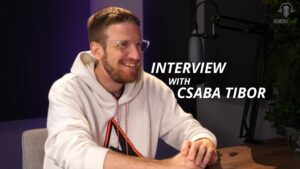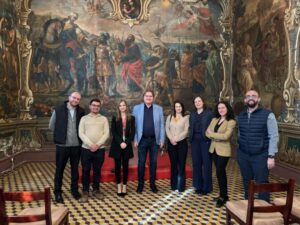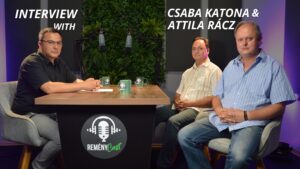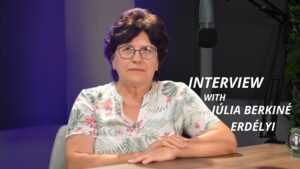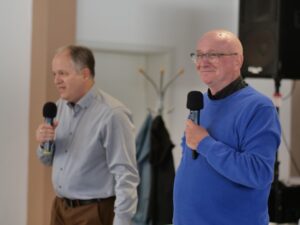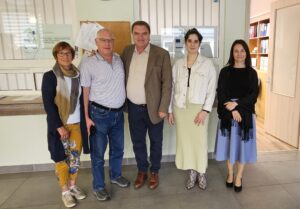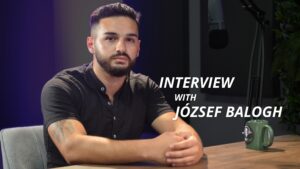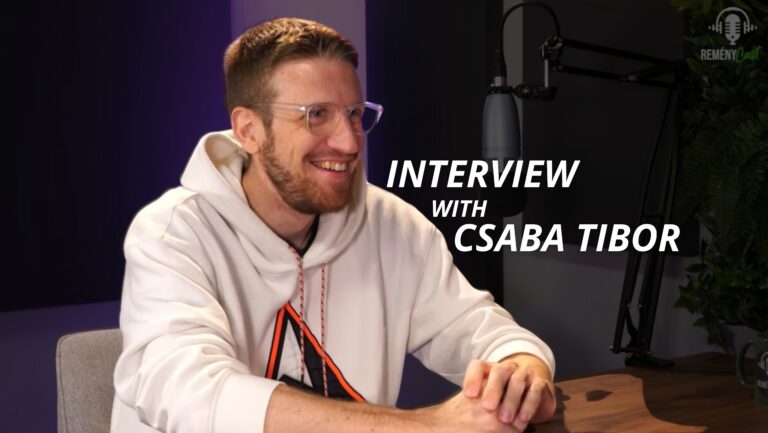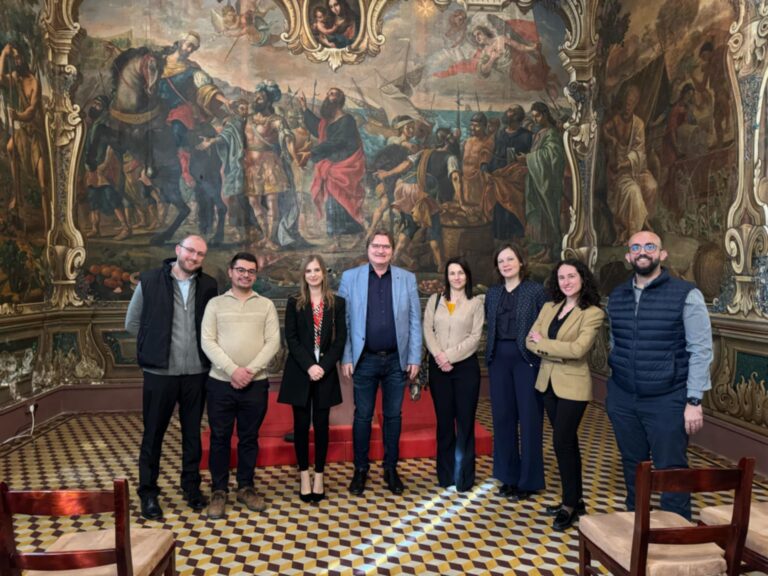The second guest of our podcast episode is László Surman, Mission Director-General of Hungarian Gypsy Missions International.
László Surman was born in 1973 in Békés, married, a father of one child, and a proud grandfather. He obtained a vocational certificate in Békéscsaba, then served in the military, and after his discharge, worked as a security guard and cash transporter. In 1998, he published his first collection of poems, and in the meantime, he served in the Roma Start Program. He established and led the Regional Roma Integration Office, and his activities were recognised by the Hungarian government with a state secretary award. In 2005, he joined HGMI, also taking an active role in public life. He served as a minority local government representative and was a member of the Békés County Roma Self-Government. Later, he obtained a theological degree from the Pentecostal Theological College and became a pastor at the Evangelical church in Elek. Meanwhile, he completed the master’s program at the Pentecostal Theological College, obtaining his master’s degree in 2020, and since 2021, he has obtained qualifications as a minority equality consultant and ethnic expert at the University of Debrecen. He is a regular guest lecturer at the Lutheran Theological University and a part-time lecturer at the PTF, primarily serving as the Mission Director-General of HGMI. His activities and life path have been rewarded with several awards and recognition over the past decades.
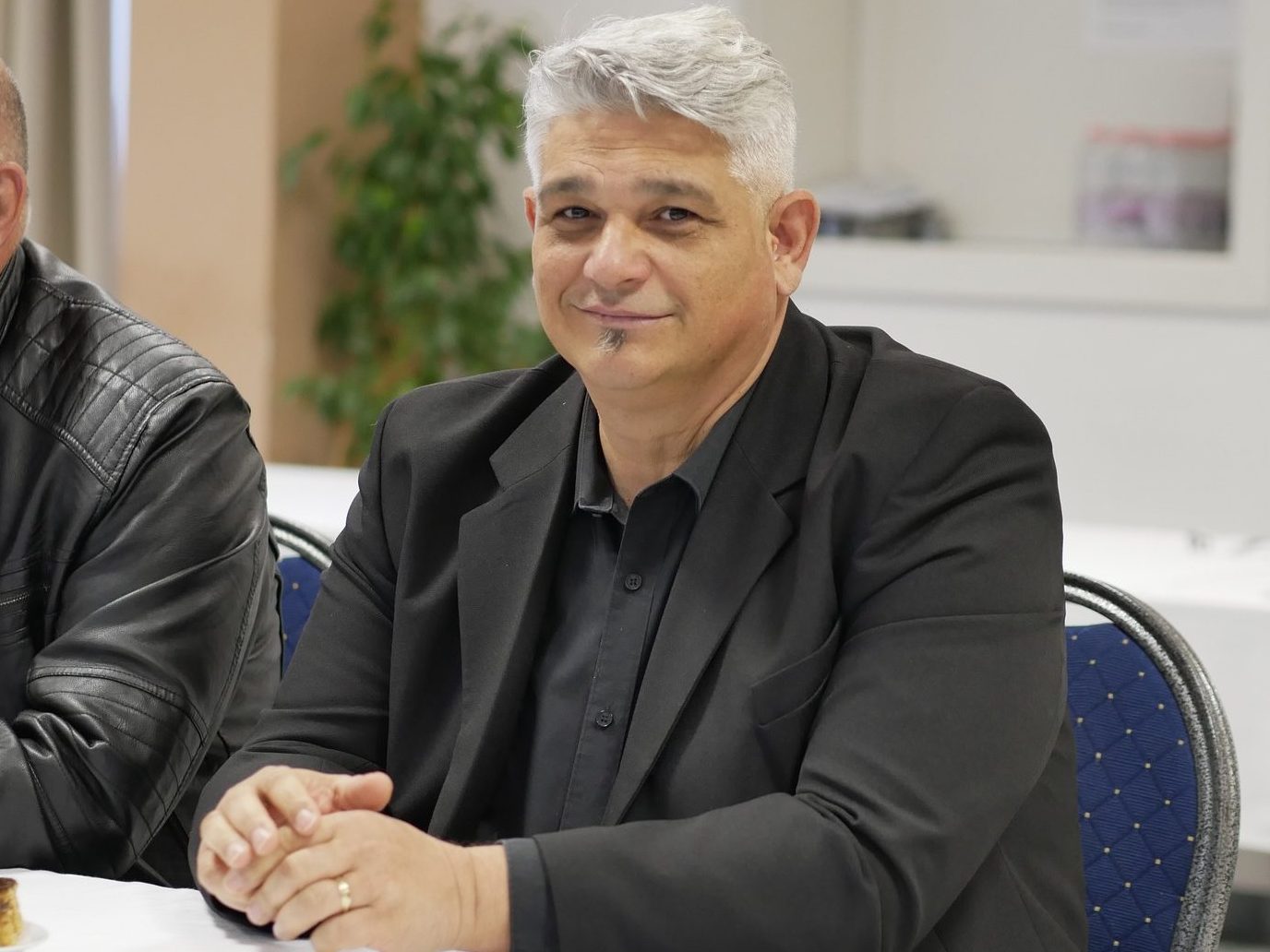
Let’s talk about your roots first. As a young child, you attended church. How did this influence your life?
I believe that from the very first moment, what happened in the church touched me. I wouldn’t claim that I became a believer right away, as I was only about five or six years old at that time, but my mother took me to a community where there were very exciting conversations, teachings, and games. Our Sunday school teachers were specifically focused on making Bible study experiential for the church. I always fondly remember those times because they laid the foundation for my life and my way of thinking. There’s a Bible verse that says when a child learns something, he won’t forget it even in old age – I experienced this firsthand.
What were the circumstances you lived in? What was your childhood like? How do you remember it?
I was born in Békés city, in a Roma settlement. This settlement was an area where there were no roads, no sidewalks, essentially just mud, and I was born into this segregated area. There are four of us siblings. I was six years old when my father decided he wanted his children to grow up in different circumstances. He sold our one-room house and bought a property in another part of the city. We, the children, still shared one room, but my parents had their own separate room. I loved my childhood very much. I grew up in a family where both with my parents and my siblings, we lived in a strong bond of love and community. I genuinely wish many children could have such a childhood to experience and live through that family connection and attachment, which I had by God’s grace.
You came to the realisation at the age of sixteen that you needed Jesus and made a decision to follow him. What kind of life were you living at that time, what led to this decision, to your conversion?
I can’t say that I led an extraordinary life at that time, but still, at the age of sixteen, people have sins they commit. What became a turning point in my life was when I realised how much Jesus loves me. He loves me so much that he gave his life for me, that he died for me and in my place. When I, at the age of sixteen, thought through my entire life, I saw that I am a very sinful person who lives without God, and Jesus himself had to experience his pain, his suffering, his death for me. The realisation that I need him determined and changed everything in my life. As the church prayed for me, suddenly, from one moment to the next I was born again. It was a meeting with God that determined my entire life.
And then, were your teenage years practically spent in this spirit?
From the age of 16 to 18-19, I attended church. I was one of the founders of the Pentecostal church in Békéscsaba. Later, I enlisted in the military in 1992, and during my military service, my life took a very big turn. I went astray, and after my discharge, I didn’t return to the church. I didn’t walk the path God called me to; I was attracted to the world, attracted to the things that are called the pleasures of the world.
You mentioned that your relationship with your parents was very close. This has remained with your mother to this day. If I understand correctly, you visit her almost every day, is that right?
That’s correct. I have my first coffee in the morning with my wife, and the second one with my mother. My life was shaped by my mother and father. My father is no longer with us, but my mother is. They were my role models.
How did you meet your wife?
I worked in a canning factory, she worked there too, she was a very beautiful, young girl. During our first conversation, we only exchanged a few words, but her kindness caught my attention along with her beauty. From then on, I tried to visit her more and more frequently, to meet her, to talk to her. Later, our acquaintance turned into love. We decided we didn’t want to live without each other, so we tied our lives together. We lived together for a year before we got married, but she was already a gift from God to me, just as much as she is to this day.
The Bible assigns a very important role to marriage. Yours can be considered exemplary. How do you see, over the past decades, how much your partner has been a support in your ministry, in your work? What do you think is the secret of cohesion?
For me, she is a support, a background without whom I couldn’t do this service and work. If I go somewhere, I know there is a solid prayer background, I know she thinks of me at home, she prays for me, and intercedes with God. This matters a lot in our relationship, in our marriage, and as I mentioned, she is truly a gift from God. I even say she is an undeserved gift. I am grateful to God for giving her to me as a spouse.
Did she repent before you did?
Although I repented at the age of 16, after my discharge, I abandoned my walk with God. Meanwhile, my father died in a car accident in Romania. In that situation, my wife was a support to me, and even now, I believe if she hadn’t been there, I wouldn’t have been able to get through that period. I was driving back from Kecskemét; I was waiting for my father to call and wish me a happy birthday; it was my birthday that day. But that didn’t happen. Instead, my brother-in-law called and told me that my father had passed away. In that moment, everything collapsed inside me. I was driving home with the gun cocked, holding the gun to my temple with one hand and gripping the steering wheel with the other while driving at 180 km/h on the road. I was dangerously close to shooting myself in the head. Although I didn’t realise it then, looking back now, I know that God spoke to me in that moment, so I eventually threw the gun to the back. The following years were terribly difficult, and in this suffering, I became even more distant from God. I was very angry with God. During this time, my wife often accompanied my mother to church, and so she also repented. Seeing her genuinely dedicate her life to God triggered a longing in me as well. I also longed for the peace that comes from God. Seeing her life, my mother’s perseverance, and through the friendly relationship with Albert Durkó, our mission leader, I turned back to God and repented.
Did you meet Albert during that time, or was this an earlier connection?
Albert was my childhood teacher, so we’ve known each other for a long time. With the Mégis Van Remény association, he was already tirelessly building the Roma mission. Since I was a representative, we usually met to coordinate various programs and other issues in my life. Anyone who knows Albert knows that a meeting with him is not just about submitting a professional program. His friendship, deep human feelings, and God’s love are very vividly manifested in these encounters, and experiencing these led to various processes within me. The story of my return can also be traced back to such a meeting between my wife and Albert. Albert approached me about this conversation because he wanted me to enroll in a Bible school. He said God spoke to him about it.
So, you actually had the desire, you just didn’t feel that it was truly God calling you to serve?
I felt ashamed, primarily before God, secondarily before people. I had previously testified to many about the love of God, yet I turned away and began to lead a depraved life. It was a great struggle within me, lasting several months. The scripture says that faith comes from hearing, and hearing through the word of Christ. And what do we learn in Bible school? About the word of God. When I understood that God loves me just as much and has plans for me just as before, when I realised that when He gives a calling, it’s irrevocable, a sense of liberation came over me. I have to admit, such a crying fit came over me that I had to hide in the bathroom for half an hour so that no one would see. I just cried and cried, and when I returned to the room, everyone knew that something had happened. I met the Lord.
And then your life gradually started to fall into place. How did you live afterwards?
I had a lot to sort out in my life. As I mentioned, I worked in a disco, was a bouncer in my personal life, had a lot of conflicts, and was involved in many fights. I had to seek out many people and apologise to them. I had to sit down with people and tell them that I was asking for forgiveness because I repented and got to know Jesus. What I did to them was a despicable thing, part of my sinful nature. And of course, the restoration of a person’s life is a longer process. It took about half a year for me to stop using the swearing expressions that Hungarians generally use.
So much so that you actually started to deal with poetry as well. This is also an important part of your life. What do you consider this?
Poetry, like any other form of art, is self-expression. I’ve always had a lot of thoughts and messages inside me. I searched for a way to bring this out, to release it. Many times, I had the feeling that I wanted to help improve the situation, the life of the Roma community, to change it in a positive direction, to make visible the values that exist within this community and this nation. I have written four volumes of poetry.
You have a very serious project, a dream, a vision: to build a church in the Delhi part of Mezőberény. You always emphasise that this is not really your dream, but God wants to build this congregation. How did this vision come about?
I was at my mother’s, drinking coffee, and suddenly an image appeared before me. I saw a long street, and at the end of the long street, I saw the facade of a church. In the vision, the Lord spoke to me, saying that what I saw, He would build with me. I prayed and was before the Lord, what should I do, what should I do? Everyone said I was not normal, who builds a church in a Gypsy settlement? My wife and I bought the plot that I saw in the vision, and we donated it to the HGMI. At the moment, the church is 50% complete, but if God helps us, the building will be handed over around May or June. We still don’t have the necessary amount to finish the construction. Our faith is stronger than the thickness of our wallet. We still need a lot of support, help. At the same time, we believe that God is building. Everything is His. We are just tools for this church to be built.
The mission has a vision, namely that 325,000 Roma people will repent and be integrated into the congregations. When you first heard this from Albert, what was your opinion?
At first, I laughed. Knowing the proportion of the Roma population in Hungary, this 325,000, I think, could roughly be about a third. I also know the circumstances and how Roma people live. So when I heard the size of the number, I chuckled a bit. But not much time passed, perhaps a few days, when I myself felt that this revelation was as if the Lord had revealed it to me. I had taken over Albert’s vision and statement to such an extent that today, without any doubt, my work, my ministry is about making this vision a reality.
So you also believe that there will be a wave of awakening, and many will repent and integrate into it?
There will be an awakening, there will be a great harvest, and I really want to be part of it myself. I don’t want to miss out on this, because God will show His grace. I know that many people perish without God. But we must think that we are a lifeboat on the sea, and the role and task of this lifeboat is to manoeuvre there and save people from death when it sees a drowning person.
We are nearing the end of our conversation. You asked us to mention two initiatives: one being the Carpathian Basin Roma Mission Forum, and the other being the Roma Vocational Colleges. Could you please briefly describe these initiatives?
Both of these initiatives are very important to me because we have a commitment to both Hungarian-speaking Roma people living in Hungary and those living beyond the borders. We aim to communicate, establish connections, collaborate with them, and support them. We would very much like Hungarian-speaking Roma people living in the Carpathian Basin, as well as ourselves, to be able to learn, think together, and build together.
The issue of the Pentecostal Roma Vocational Colleges is indeed a very old dream. Together with Albert Durkó, we have participated as speakers in several such vocational college lectures. The Hungarian government is currently running such a program, which has indeed been successful. If these intelligent young people and adults living in Roma settlements receive the proper support, they can achieve anything. I believe that within the framework of HGMI, there are many young and middle-aged men and women who have the intellect and the desire to learn. They just need a little support, a little push to complete their studies. And it is our job to provide this kind of support.
The purpose of this conversation is also to demonstrate how one can go from deep poverty to a university lecture hall. What advice would you give to young people who are in a situation, in a destiny, like you once were?
I think that if I managed to come from the last street, the last house, the corner house of a Roma settlement to a new way of thinking, then anyone can succeed. In order for me to travel this path, I needed the encouragement and support of people who always stood behind me. God always provided people who shaped my life path, my direction. If there is a little spiritual support, a little encouragement, alongside material resources, then I believe that the Roma community is no less intelligent, no less capable than the majority of society. There is nothing less in them to achieve their dreams, to fulfill them.






